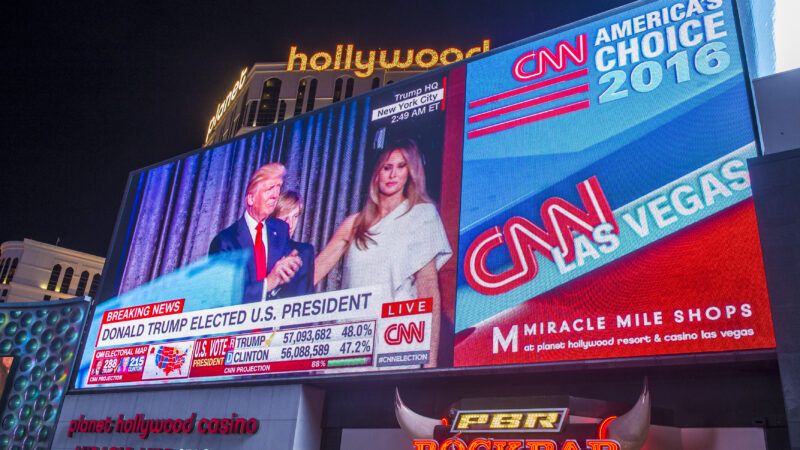Pay Attention to Policy, not 'Narratives'
Punditry ought to be less important than wonkery.

As a policy wonk, I view each election as a calculation of which candidate is most likely to advance the limited-government policies that I favor. It's rarely an easy choice given that neither of the major parties is particularly libertarian and smaller parties tend to be goofy and have almost no chance of winning.
Republicans sometimes talk like libertarians on issues related to taxes, regulation, and spending, but promote police-state policies (asset forfeiture, the drug war), tariffs, tech regulation, and other nonsense that ramps up federal power. I'm far from simpatico with Democrats, but they have been decent on deregulating housing and promoting justice reform. So, it gets complicated.
As a voter, I look not just at the totality of issues, but their importance. For instance, property rights mean more to me than tax policy. The particular office matters: I don't care about the controller's abortion views any more than the insurance commissioner's foreign-policy ideas. Mainly, I don't have an emotional connection to any party.
This policy-oriented approach has left me at a disadvantage. I never saw Donald Trump coming because I found it incomprehensible—still do, actually—that anyone would support a man with so little substance and so much narcissistic blather. I never understood how Sen. Bernie Sanders (I–Vt.), a socialist who honeymooned in the Soviet Union, came close to getting the Democratic nod.
The reason comes down to "narratives." Economists have a term called "rational ignorance." I'm paid to write about policy, but most voters don't have good reason to invest hours into learning about candidates' voting records and positions. It's not worth the time given the limited value of one vote. I can't blame them.
Instead, opinion leaders create narratives about how the world works—and then voters essentially buy into one that suits their biases. They pick a team. Social media reinforces each side's thinking habits. As the election arrives, most voters aren't doing a cost-benefit analysis—but embracing the candidate who touts the story their team tells (whether it's true or not).
"Narratives … provide a rich source of information about how people make sense of their lives, about how they construct disparate facts and weave them together cognitively to make sense of reality," explains a 1998 UC Irvine study. They can be helpful for understanding the world, but they can also send people down a rabbit hole.
"Yes, totalitarian states that prescribe a narrative orthodoxy against which no deviation is quartered are nothing new," wrote Daniel Rothschild in Discourse magazine. "What is new is that today, in otherwise liberal societies, people are voluntarily enclosing themselves in intellectual prisons…Obviously, factionalism in a free society isn't the same as totalitarianism. But both thrive by providing absolute certainty in a complex world and declaring dissidents to be treasonous."
Therefore, fewer people can be persuaded by evidence. If you subscribe to the narrative that your opponents want to destroy everything that you find holy and dear, then you'll put up with anything from a candidate from your tribe. During the 2016 election, Republicans embraced the "Flight 93" theory—it's time to rush the cockpit because a Hillary Clinton presidency would crash democracy.
Democrats believe something similar about a Donald Trump re-election, although they're on more solid ground given that he did indeed try to steal an election and his election-denying acolytes filled the GOP ticket this year. Polls show most GOP voters have bought into that denialism narrative—and no evidence likely will sway them from their vote-stealing fantasies.
Writing about "The Death of the American Political Scandal," National Review's Christian Schneider notes that voters largely shrug at flaws that would have derailed candidates a few years ago. This involves the movement away from my perspective—analyzing candidates' positions—to one that's based on accepting broad political stories.
Republicans' focus on culture wars has transformed "American politics from a battle of ideologies to a raw contest for power," he added. "If you truly believe that the last thing keeping your child from being forced to attend a drag-queen story hour at his or her school is which party controls Congress, then it makes sense you'd be willing to accept a Senate (or House) candidate with dramatic personal flaws."
Narrative also helps explain why so few conservative pundits and Republican politicians could—without caveats and "whataboutism"—simply condemn the recent hammer attack on House Speaker Nancy Pelosi's husband, Paul Pelosi, at their home in San Francisco. Many people have spread bizarre conspiracy theories, with some conservatives even joking about the attack.
Jumping on the narrative bandwagon can take you to some morally dubious places. I don't expect voters to adopt my balls-and-strikes voting strategy. But unless there's a movement back in that direction, the story of our democracy might not have a happy ending.
This column was first published in The Orange County Register.



Show Comments (123)